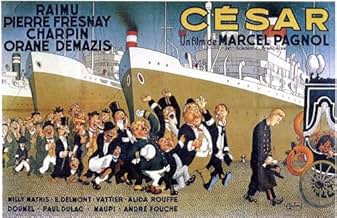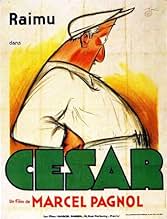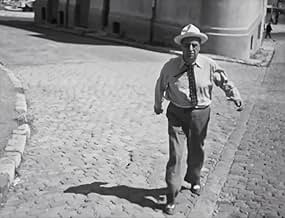Füge eine Handlung in deiner Sprache hinzuHonoré Panisse is dying, cheerfully, with friends, wife, and son at his side. He confesses to the priest in front of his friends; he insists that the doctor be truthful. But, he cannot bring... Alles lesenHonoré Panisse is dying, cheerfully, with friends, wife, and son at his side. He confesses to the priest in front of his friends; he insists that the doctor be truthful. But, he cannot bring himself to tell his son Cesariot that his real father is Marius, the absent son of César,... Alles lesenHonoré Panisse is dying, cheerfully, with friends, wife, and son at his side. He confesses to the priest in front of his friends; he insists that the doctor be truthful. But, he cannot bring himself to tell his son Cesariot that his real father is Marius, the absent son of César, Cesariot's godfather. Panisse leaves that to Fanny, the lad's mother. Dissembling that he... Alles lesen
- Honoré Panisse
- (as Charpin)
- Innocent Mangiapan
- (as Maupi)
- Le docteur Félicien Venelle
- (as Edouard Delmont)
- Pierre Dromard
- (as Bassac)
Empfohlene Bewertungen
The port is still (albeit much less so) a smuggler's paradise, and the social life of the city is still centred around good food, good love, and strong drink. Pagnol and Raimu knew the city well, and gave it the starring role in the trilogy. Imagine their joy at being able to relocate a stage play to the Mediterranean coast and use genuine atmospheric exteriors of the old port in all its pre-war glory. The city, and particularly the docks, took a real beating from both sides in WW2, so Pagnol not only created a few masterpieces of cinema, but also an invaluable document of a lost architecture and layout.
The nonsense between L'Academie and Pagnol was related to the prevailing Parisian view of southerners as being crude, unsophisticated people who lived a simple life of manual labour, procreation, drinking and eating (cul terreux). The view from the south that still prevails, is one of a Paris riddled with snobbish elites (peigne cul) totally divorced from the realities of healthy living . The wonderful climate and diet of the Mediterranean coast has long been a source of envy for those condemned by fate to dwell in the damp root vegetable fogs of northern France. Pagnol was gleefully rubbing their noses in it.
Pagnol opened up a lot of avenues in film, but the people of Marseilles remember him mostly for his authentic capturing of la vie quotidienne. I'll drink to that.
While I loved MARIUS (1931) and Fanny (1932), I found myself falling asleep repeatedly while watching César. Again and again and again, I found myself dozing. At first, I thought I was just tired, but when I stopped the DVD each time I felt wide awake. I think in hindsight my reaction was because after the first few minutes of this movie, the trilogy, for me, was finished. In other words, the story was as complete as it should be and continuing it seemed superfluous. The 1961 Fanny film ended there, but continuing was probably, in hindsight, not the best decision. I honestly feel that the average viewer could see MARIUS and FANNY without having to see César. It just didn't seem necessary or compelling.
As far as performances and writing go, Raimu, who played Marius' father, was a marvelous actor and was excellent in all three movies. He was also fantastic in Pagnol's film La FEMME DU BOULANGER. An amazing talent. Also, Pagnol has written some amazing films apart from this series--try to see them all. It's just that of all of his work and the books I have read by him, my least favorite is César.
WUSSTEST DU SCHON:
- WissenswertesOdette Roger is credited in the opening credits as "la bonne de l'hotel" (the hotel maid) but does not appear in the film. The hotel sequence was cut out of the final print.
- Zitate
Honoré Panisse: One can't live without doing wrong.
- VerbindungenFeatured in Les sentiers Marcel Pagnol. Les chemins d'une vie (2005)
Top-Auswahl
Details
Box Office
- Bruttoertrag in den USA und Kanada
- 8.262 $
- Eröffnungswochenende in den USA und in Kanada
- 7.720 $
- 8. Jan. 2017
- Weltweiter Bruttoertrag
- 8.262 $
- Laufzeit2 Stunden 48 Minuten
- Farbe
- Sound-Mix
- Seitenverhältnis
- 1.37 : 1
Zu dieser Seite beitragen































